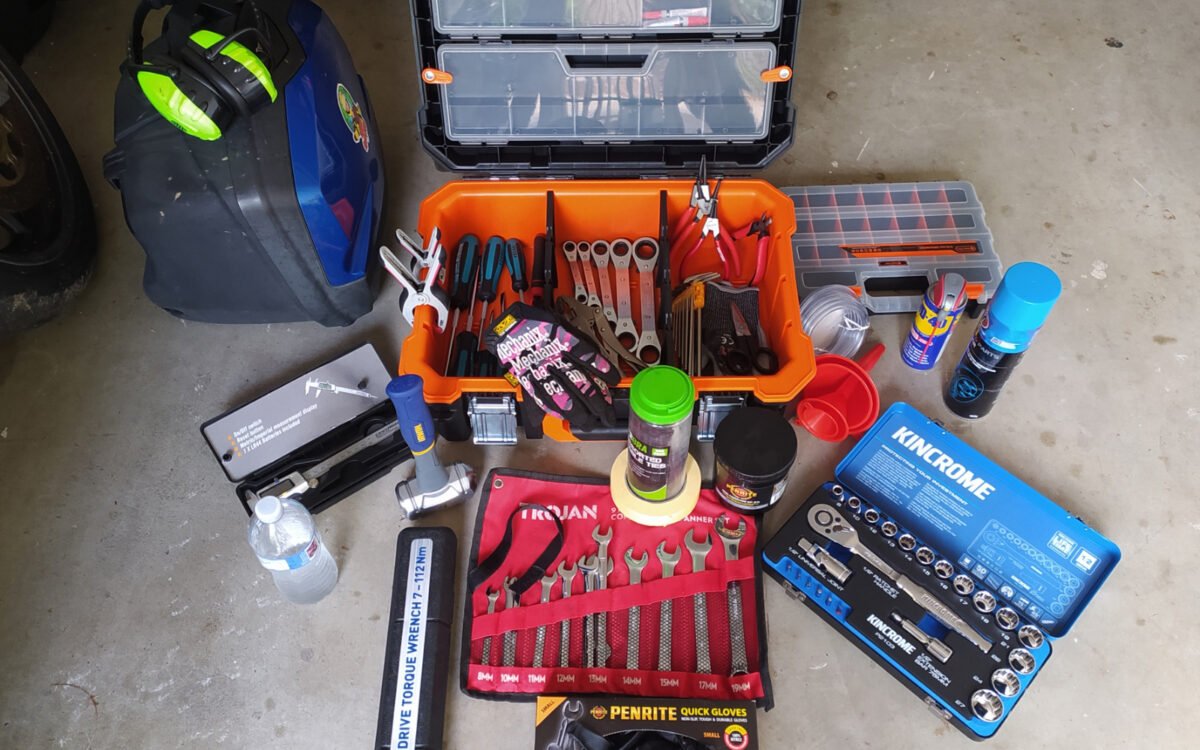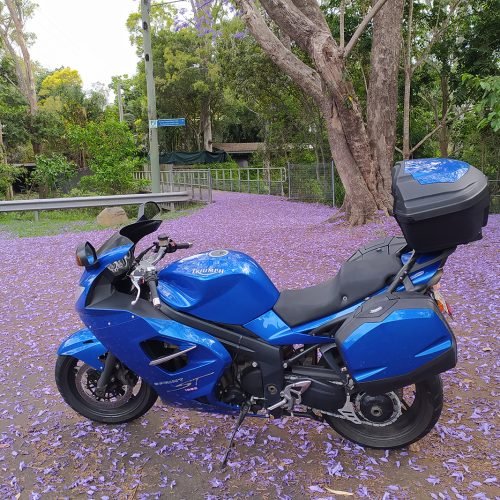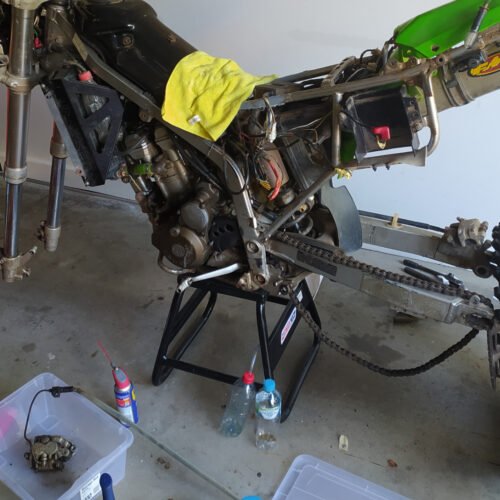Whether you are learning the basics or building a motorbike from scratch, you will need to set up a working area and get some tools to work efficiently on your motorbike. Remember the most important part of learning is having fun, so make sure you feel comfortable in your working space.
My garage is small. I have to play Tetris with six motorbikes. However, despite the lack of space, I’ve set up a nice home workshop without spending zillions of dollars.
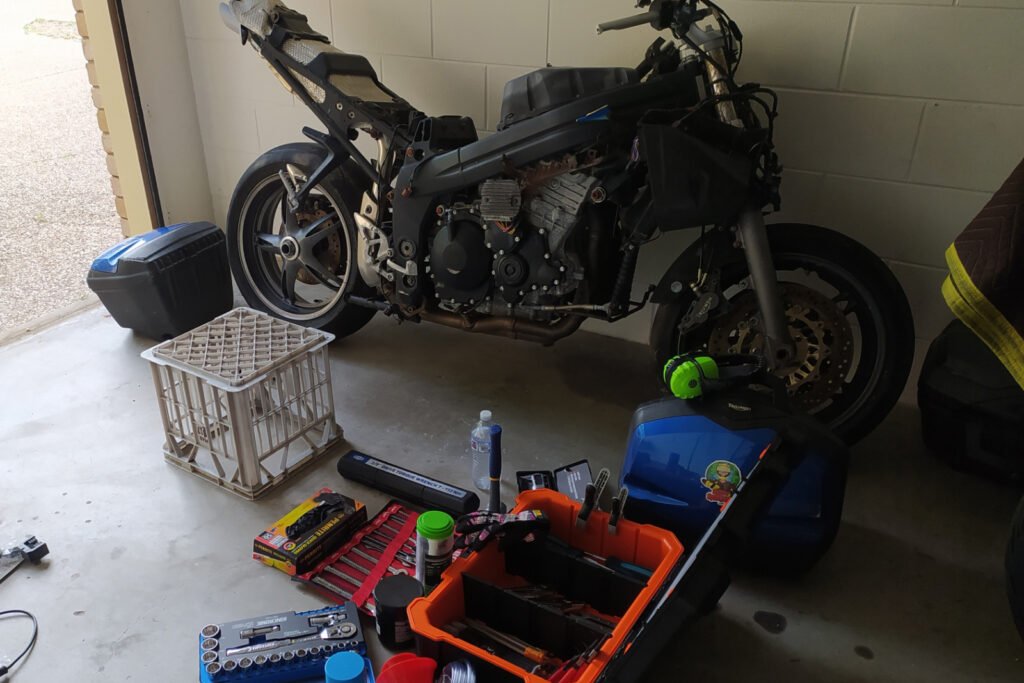
Free or cheap workshop furniture (workbench, storage, and shelving) and good deals in tools from hardware stores are the main components of my wrenching paradise.
Don’t forget to let Santa know about your workshop needs in your next letter. A torque wrench, an air compressor or a clutch tool are excellent Christmas presents. How about your birthday? Time to nourish your wrenching spirit with some new tools! 😉
Safety first
I’ve got not-so-beautiful working hands, but I like to keep them healthy. That’s the reason I work with powder-free nitrile gloves and, depending on the job, Mechanix gloves. My skin is so much nicer since I stopped using aggressive soaps.
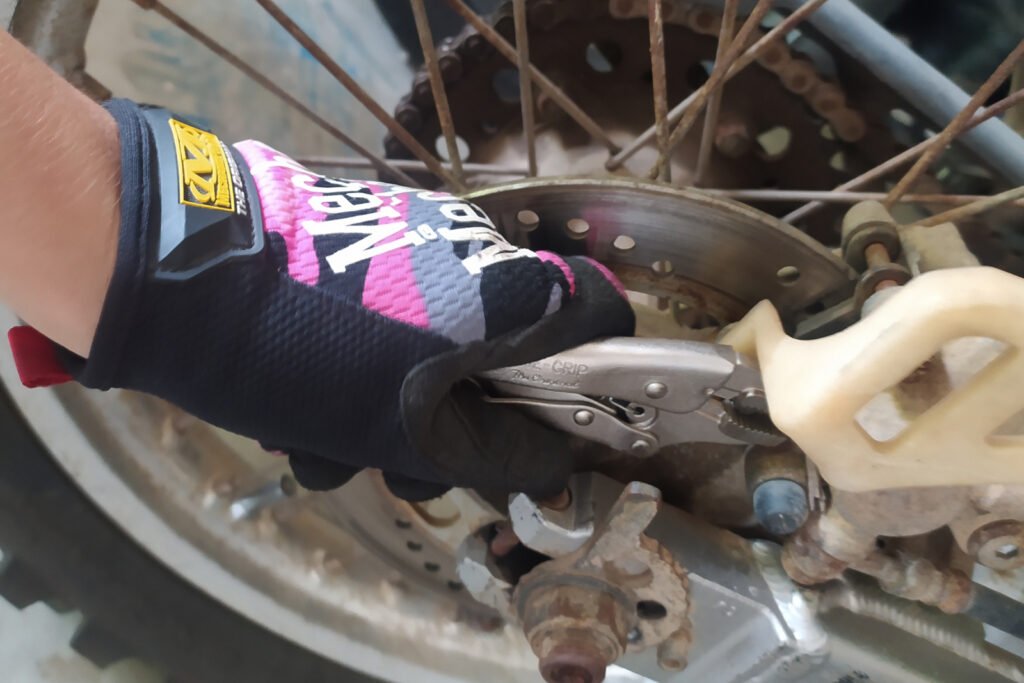
When using the air compressor or other noisy tools, I wear noise-cancelling earmuffs.
Keep things tidy
You will need, at least, a small workbench with a multipurpose vice (125 mm).
If you can’t afford a tool cabinet with drawers, there are some handy alternatives like heavy-duty plastic tool cases. I don’t know if this brand is available in your country, but I’m in love with Tactix® tool storage solutions.
Regarding bits and pieces, I like to keep every single bolt, nut, and washer in labelled organizers.
Basic hand tools
I love good tools but, let’s be honest, no need to spend lots of money unless you are obsessed with a particular brand. Chromium-vanadium and chinesium tools are perfect for hand-torque applications.
If you’re using serious impact tools, you may need chromium-molybdenum accessories like sockets and bits. However, if you accept a kind advice from this wrench junkie, keep your savings for essential tools and equipment you will definitely need (torque wrench, air compressor, etc.).
All my motorbikes use metric bolts, so I only use metric tools. These are my sets:
- Open-end/ring spanners: From 8 mm to 22 mm, both ends the same size.
- Ratchet and sockets: From 8 mm to 22 mm. Make sure your set comes with extension bars, and don’t forget to add a couple of small (8 mm and 10 mm) thin-wall sockets for hard-to-access bolts.
Note: Remember to keep an 8 mm, a 10 mm, and a 12 mm of each always handy.
- Screwdrivers: Flat and JIS (they work on both Phillips and Pozidriv screw heads).
- Hex keys: I have a standard set of 90º-angled Allen keys, but I must confess T-handles are more practical.
- Hammer: Can you spot my Thor hammer in the photo? No need to get a heavy-duty hammer like that, just a rubber hammer is fine. If you have a heavy-duty hammer, don’t forget to add a soft surface between the hammer and the impact surface to avoid disasters and collateral damage.
- Electrician scissors: More precise than normal kitchen scissors.
- Breaker bar: For untightening the untightenable.
Note: Sometimes, a 1/4″ drive tool with interchangeable bits and sockets becomes handier than having a collection of screwdrivers and T-handle tools spread over the floor.
When things get complicated
Get ready to fight naughty nuts, internal and external circlips, and all-kind safety fasteners with a set of different-sized pliers, including locking and circlip pliers. Ah, and a heat gun.
Optional but handy
- Ratchet spanners: Honestly, they’re cute but I barely use them. I prefer the combination ones.
- Adjustable spanner: Up to 30 mm. You never know when you might need it.
- Flush cutting pliers: For cutting cable ties, wires, etc.
- Masking tape: I label everything, from nuts-and-bolts organisers to every single wire I disconnect from any of my motorbikes. Don’t forget to add a pencil and a permanent marker to your shopping list.
- Caliper: Precision tool used for measuring dimensions (length, thickness, inner and outer diameter, etc.) of an object. Quite useful when I need to order bolts, nuts, handlebar grips or exhaust pipes.
- Air compressor: Handier than a pump as you can also use it for sanding, painting, removing water drops, dust, and debris from tricky corners, etc. Don’t forget to buy the fittings, thread seal tape, and pressure gauge.
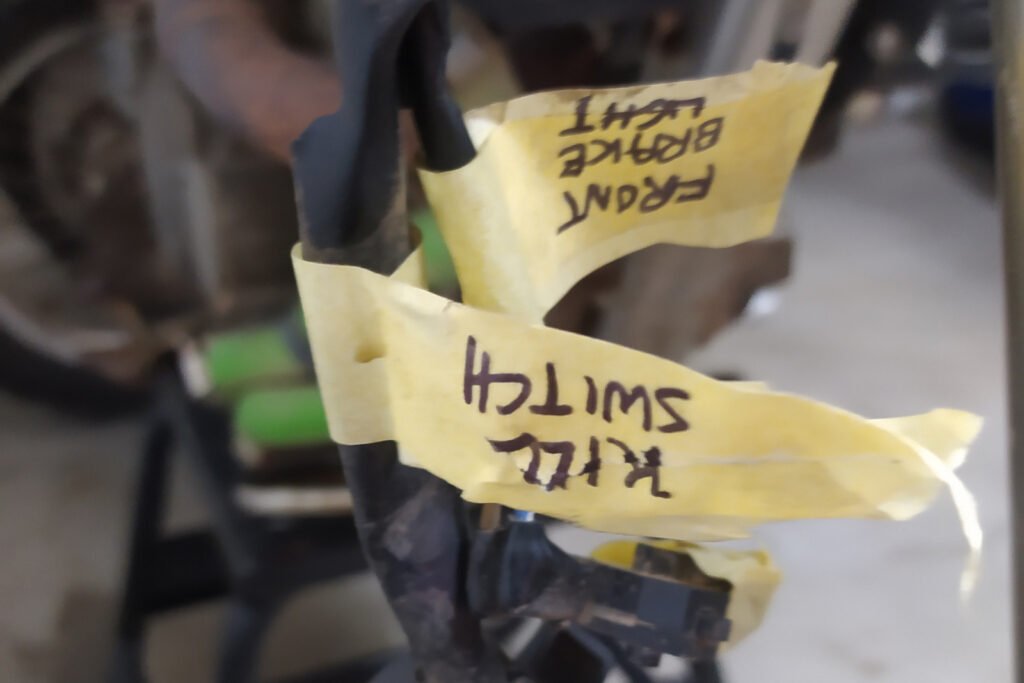
Motorbike-related essentials
- Paddock stands: Triple-tree better than standard front stand, so you can do your fork, and rear stand.
- Torque wrench: I’ve got a 3/8″ drive with an operating range from 7 N·m to 110 N·m that covers most of the jobs I do on motorbikes. There are some parts that require higher torque, like the rear wheel axle nut, so a 1/2″ drive would work better for this specific cases. For small torque loads, a 1/4″ drive will be always more precise than a 3/8″.
- Oil filter wrench: Makes my life easier.
- Oil drain pan: I use a 5 L plastic container. It’s cheaper and does the same job.
- C spanner: I used to adjust the chain with a long flat-headed screwdriver and the hammer, but I ended up damaging the eccentric hub, so I bought a C spanner. Please don’t do a Mar and pamper your motorbike parts 😌.
- Chain tool: For breaking and riveting chains.
- Battery charger: A must-have in every garage.
- Multimeter: For measuring potential difference, current, resistance and other electrical properties.
- Set of wire brushes: Brass wire for spark plugs and removing rust from almost any type of metal. Stainless steel wire for aluminium and stainless-steel surfaces.
- Brake bleeder: Get an empty plastic bottle, make a hole in the cap, pass a PVC 8 mm (5/16″) hose through and voilà!
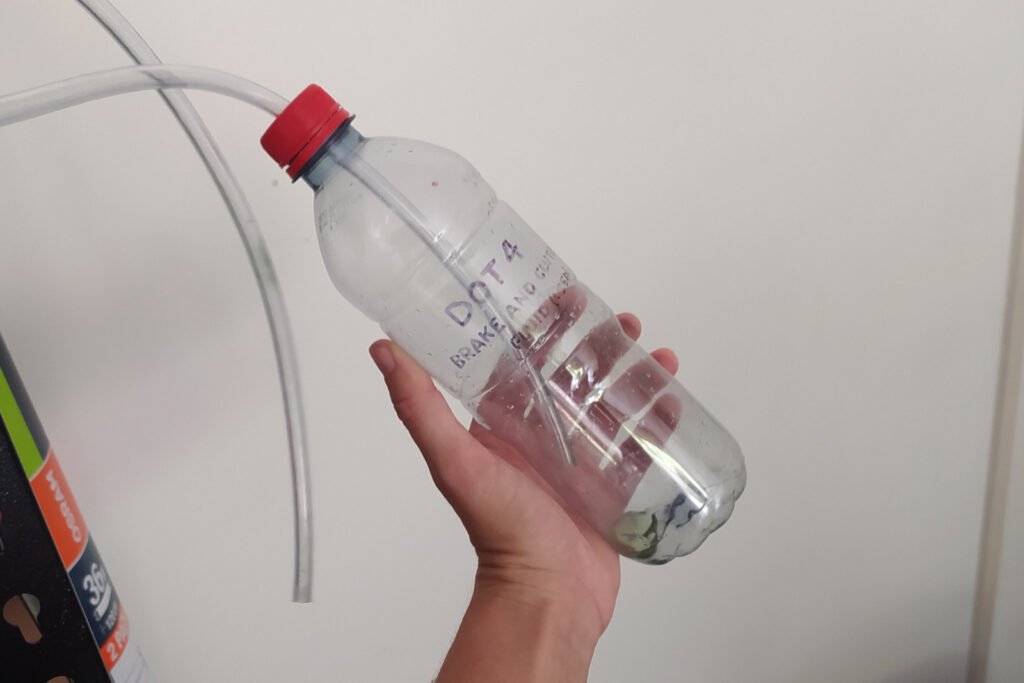
Tip: Buy several metres of PVC hose and keep 2 m in your motorbike. If your motorbike runs out of fuel in the middle of nowhere, you can always borrow some from your mate’s tank by syphoning. Thanks Bernoulli! 💡
- Clutch pliers: For holding clutch hubs, flywheels, sprockets, etc.
- Cable ties and duct tape: Must-have miscellaneous. You can fix the world with this couple.
- Funnels: Prevent spillage when pouring or transferring liquids.
- Liquid containers: Jerrycan, empty bottles, etc. Try not to keep liquid waste at home for a long period of time and take your containers to the closest waste management centre.
Chemicals
- Multi-purpose penetrating oil: WD-40, 3-in-1, Shift Ya Bastard, or your favourite.
- Cleaning sprays: Brakes and parts cleaner, heavy-duty degreaser, kerosene (it’s the best chain cleaner and rust remover) and others.
- Fluids: Oil, brake fluid, coolant, jerrycan with some petrol, etc.
- Liquid adhesives: Thread locker and cyanoacrylate adhesive (super glue).
- Grease: Chain lube, lithium-based grease, moly grease, etc. Different compounds for different applications. Now let’s watch the movie 😁.
- Baking soda: Effective degreaser when mixed with vinegar. You can also repair hard plastics making cyanoacrylate cement spreading some powder on super glue ⚗️, but I will talk about this in another article. This wonderful polymer deserves its own stage.

